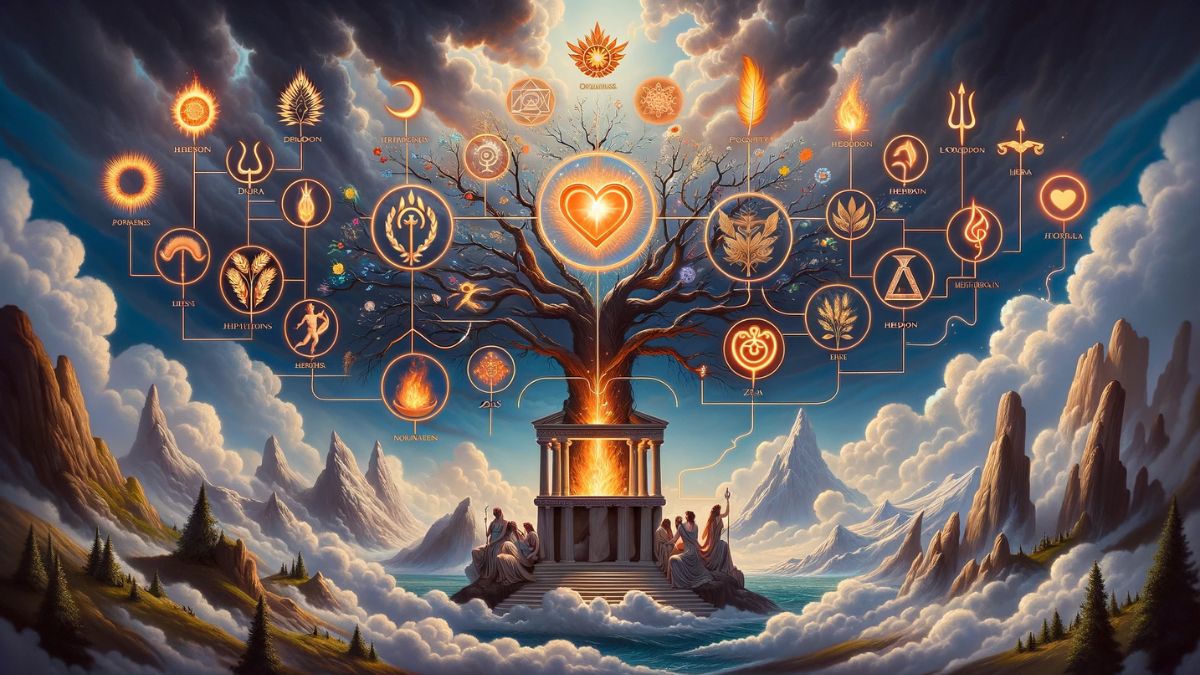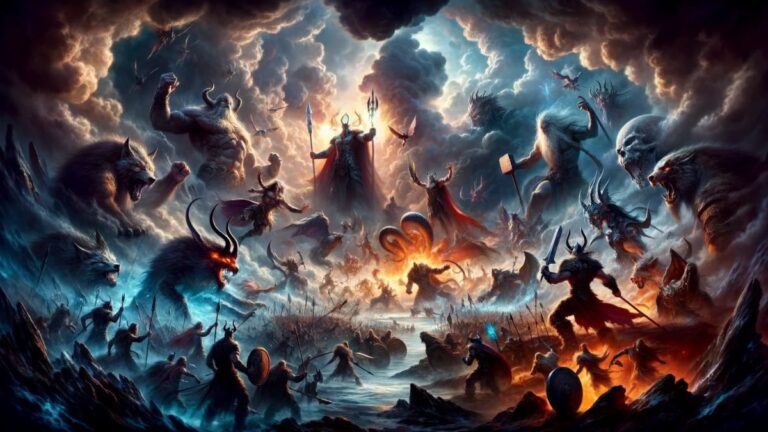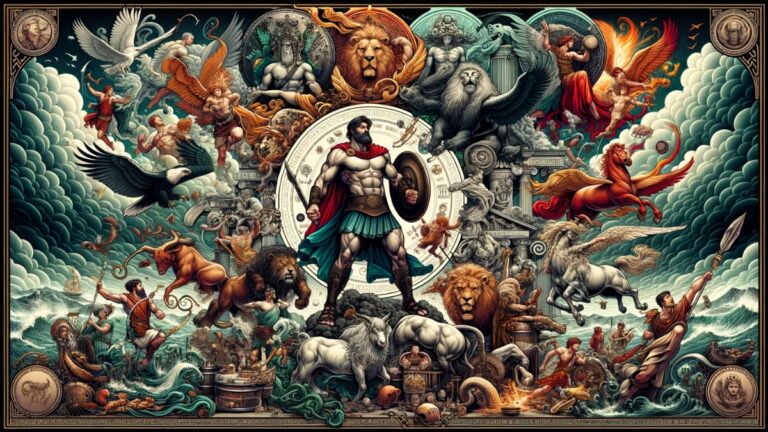Hestia Family Tree: The Hearth’s Warmth and Sacred Lineage

Hestia, the Greek goddess of the hearth and home, holds a special place in the hearts of many. Her story isn’t just about the flames she guards; it’s about the warmth and stability she brings to family and community. In this article, we’re diving into Hestia’s family tree, exploring how her sacred lineage intertwines with the gods and mortals of Greek mythology. It’s a tale that brings us closer to understanding the importance of home, tradition, and the bonds that tie us together.
Hestia’s Family Tree
- Cronus (Father)
- Titan god of time and ages
- Rhea (Mother)
- Titaness goddess of fertility and motherhood
- Siblings:
- Hestia (Eldest sister)
- Goddess of the hearth, home, and family
- Demeter
- Goddess of the harvest and agriculture
- Hera
- Goddess of marriage and queen of the gods
- Hades
- God of the underworld
- Poseidon
- God of the sea
- Zeus (Youngest brother)
- King of the gods, god of the sky and thunder
- Hestia (Eldest sister)
Who is Hestia? – The Goddess of Hearth and Home
Hestia is often celebrated as the kindest and most gentle of all the Greek gods and goddesses. She’s known as the protector of the hearth and home, making her a central figure in daily domestic life. Unlike other deities, Hestia doesn’t have thrilling myths of adventure or conquest. Instead, her presence is felt in the warmth of the fire and the unity of family gatherings. Her essence is about creating and maintaining peace and harmony within the household.
In ancient times, Hestia’s flame was more than just a symbol. Every home, town, and city had a hearth dedicated to her, where a fire burned continuously to ensure her blessings. This fire wasn’t just for warmth or cooking; it was a sacred flame that represented the heart and soul of the community. Hestia’s influence extended to the state level, too, with her flame burning in government buildings and public spaces, signifying the unity and well-being of the society.
Despite her significant role, Hestia is often depicted as a modest and veiled figure, embodying the virtues of domesticity and family. She took a vow of eternal chastity, which further highlights her image as a nurturing and non-confrontational deity. This commitment to the home and hearth makes Hestia a unique and deeply revered figure in Greek mythology, embodying the warmth and stability that are crucial to family life.
The Birth of Hestia and Her Siblings
Hestia was born to the Titans Cronus and Rhea, making her a member of the original Olympian gods. Her birth story is as dramatic as it gets in Greek mythology. Cronus, fearing a prophecy that he would be overthrown by one of his children, swallowed each of them at birth. Hestia, being the eldest, was the first to be swallowed and the last to be freed, making her both the oldest and youngest sibling, in a sense.
The liberation of Hestia and her siblings came at the hands of their youngest brother, Zeus. After growing to adulthood, Zeus tricked Cronus into vomiting up his siblings, starting with the stone he swallowed last, thinking it was Zeus, and ending with Hestia. This dramatic rescue bonded the siblings and set the stage for their reign over the gods and the world of men. It marked the beginning of a new era, with the Olympians led by Zeus establishing their dominion over the heavens and the earth.
This tale of Hestia’s birth and the subsequent overthrow of Cronus highlights the themes of resilience and the enduring nature of familial bonds. Despite the tumultuous start, Hestia and her siblings emerged as the new rulers of the cosmos, each taking on roles that would shape the world of gods and men. Hestia’s own role, while less flashy than that of her siblings, was no less important, providing the foundation of stability and harmony upon which society could flourish.
Hestia’s Place Among the Olympians
Hestia’s role among the Olympian gods is unique. She didn’t seek the spotlight or get involved in the many disputes and battles that characterized the lives of other deities. Instead, Hestia chose a path of service, keeping the hearth and maintaining the sacred fire, both in the homes of mortals and on Mount Olympus itself. This role was essential, as the hearth was the center of family and social life, and the fire was a symbol of continuity and community.
Despite her significant contributions, Hestia is one of the lesser-known Olympians, often overshadowed by the more dramatic stories of gods like Zeus, Hera, Poseidon, and Athena. However, her presence was felt everywhere, and her blessings were sought by all. In times of strife or conflict, it was to Hestia that the gods and mortals alike would turn for comfort and restoration of peace.
Hestia’s decision to relinquish her seat on the Olympian council to Dionysus, the god of wine, further underscores her selfless nature. This act was not a sign of weakness but a testament to her commitment to the hearth and home over personal glory or power. By ensuring that the hearth remained the focal point of divine and mortal attention, Hestia solidified her place as an essential, though quiet, force among the Olympian gods.
Key Relationships and Alliances in Hestia’s Family
Hestia might not be the most talked-about goddess in myths, but her relationships with other deities highlight her importance. Being the eldest sibling, she shared a deep bond with her brothers and sisters, especially Zeus, Hera, Poseidon, Demeter, and Hades. Her role as the goddess of the hearth made her a central figure within the family, promoting unity and harmony among the often-contentious Olympians.
Her interactions with other gods were marked by a sense of mutual respect and non-interference. Hestia chose not to marry or seek romantic entanglements, which allowed her to remain neutral and above the fray of the gods’ frequent quarrels and rivalries. This neutrality made her a calming influence and a mediator within the divine family, often soothing tensions and fostering a sense of peace and stability.
One of the most significant alliances Hestia had was with Hermes, the messenger god. Together, they were known as the ‘Gods of the Household’, with Hermes managing the external affairs of commerce and communication, and Hestia overseeing the internal harmony of the home. This partnership underscored the balance between the public and private spheres, ensuring that both the home and the community at large flourished under their watchful eyes.
The Symbolism of Hearth in Greek Culture
The hearth held a sacred place in ancient Greek life, symbolizing much more than a physical space for cooking or warmth. It was the spiritual center of the home, where families gathered, shared meals, and performed rituals. Hestia’s association with the hearth made her an integral part of daily life, her presence felt in every flicker of the flames. This connection between Hestia and the hearth underscored the importance of the home as a source of comfort, stability, and sanctuary.
In a broader sense, the hearth represented the unity and continuity of the family and the community. The perpetual flame was a symbol of everlasting life, connecting the present with the past and future generations. It was common for new colonies to take flames from the mother city’s hearth to symbolize continuity and unity. Hestia’s flame, therefore, was not just a physical fire but a symbol of the enduring bond between individuals, families, and communities.
The ritual of maintaining the hearth fire spoke to the reverence for Hestia and the sacredness of the home. Every meal began and ended with an offering to Hestia, acknowledging her role in providing security and sustenance. This daily acknowledgment of Hestia’s presence reinforced the values of hospitality, respect, and gratitude that were central to Greek culture.
Hestia’s Legacy and Her Role Today
Despite the passage of millennia, Hestia’s legacy endures in the modern world. Her spirit lives on in the practices and values that prioritize family, home, and community. The concept of ‘hearth and home’ remains a universal ideal, symbolizing warmth, safety, and belonging. Hestia’s virtues of peace, stability, and hospitality continue to be celebrated, reflecting the timeless human desire for harmony and connection.
In contemporary culture, Hestia is often evoked in discussions about the importance of home life and the value of nurturing family relationships. Her legacy is seen in the rituals that bring families together, such as shared meals and celebrations, which echo the ancient offerings made at the hearth. Hestia’s influence is also apparent in the emphasis on creating peaceful and welcoming living spaces, where people can find refuge from the outside world.
Furthermore, Hestia serves as a symbol for those who seek a life focused on the home and community rather than on external achievements or recognition. Her choice to forgo marriage and personal glory in favor of tending the sacred fire is a powerful reminder of the importance of service, caretaking, and the simple, yet profound, joys of domestic life. In this way, Hestia’s legacy continues to inspire and guide, reminding us of the warmth and light that the hearth—and by extension, the home—brings to our lives.






